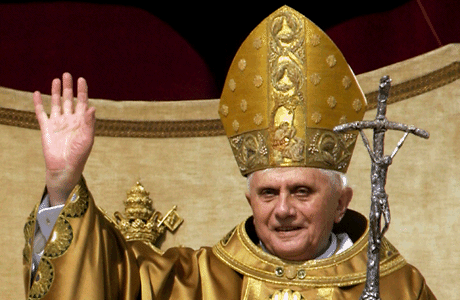Pope Visits Latin America
March 26, 2012
Pope Benedict XVI, head of the Roman Catholic Church, continued his visit of Latin America, leaving Mexico for Cuba. The 84-year-old pontiff, who was elected pope in 2005 after the death of Pope John Paul II, is visiting Spanish-speaking Latin America for the first time. (Pope Benedict visited Portuguese-speaking Brazil in 2007.) Mexico, in which more than 75 percent of the people are Roman Catholics, has the second-largest Catholic congregation in the world, after Brazil.

In March 2012, Pope Benedict XVI visited Mexico and Cuba, where he celebrated Mass before hundreds of thousands of Roman Catholics. (Courtesy of Franco Origlia, Getty Images)
Pope Benedict used his visit to Mexico both to address the faithful and to speak out on political issues several months before the July 1, 2012, presidential election. Upon his arrival on March 23 in Silao, in central Guanajuato state, the pope condemned the drug-related violence that has left some 50,000 people dead in northern Mexico over the past five years. He urged the people to renounce the “idolatry of money” that fuels the drug trade. On March 24, the pope had a private meeting with Mexican President Felipe Calderon, whose crackdown on the drug cartels has been central to his administration. The two leaders discussed such issues as climate change and organized crime.
On March 25, the pontiff led an open-air Mass beside the Christ the King monument at Bicentennial Park, near Silao. A crowd of some 500,000 people had gathered from across the nation, thousands of them camping out in the field at night, to see the pope.
In Cuba, the pope was scheduled to preside at two public Masses during his three-day visit. Pope Benedict’s plane landed in the southeastern city of Santiago de Cuba on the afternoon of March 26. He was scheduled to arrive in the capital, Havana, on March 27, where he was to celebrate Mass in Revolution Plaza. Although Communist Cuba was officially an atheist state until the 1990′s, an estimated 40 percent to 60 percent of the island nation’s people are Catholics. However, few Cuban Catholics practice openly.
Benedict’s visit was expected to boost tourism to Cuba, where President Raul Castro, who was elected in 2008, has enacted free market reforms allowing people to establish private businesses. The pope has urged Cuban leaders to abandon the country’s decades-old Marxist system, which he says “no longer corresponds to reality.”


